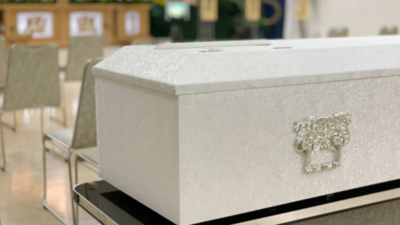Man concealed his father’s dead body for two years in wardrobe; Here’s why

A Japanese man was arrested for keeping his father’s body in a closet for two years following the death of his father, reportedly trying to prevent the expensive funeral. This bizarre and disturbing story has evoked a variety of responses from the public and highlights the increasing strains of funeral expense, financial hardship, and feelings of loneliness in contemporary Japan.
Nobuhiko Suzuki aged 56, had been operating a Chinese restaurant in Tokyo until the mysterious and inexplicable shutdown of the business for one week triggered concerns among his neighbors. The concerned neighbors informed the authorities. When police officers arrived at his home, they were shocked to find the skeletal remains of Suzuki’s father, who had died at the age of 86 in January 2023, locked away in a wardrobe. Upon investigation, Suzuki admitted to hiding the body shortly after his father’s death, claiming that he came home from work one day to find his father’s lifeless body.
The reason for the death of his father remains unknown, but Suzuki’s actions were, in his own words, motivated by the sheer financial cost of organizing a funeral. He told the police that he just couldn’t afford the expense of a decent funeral, so he made the extreme and tragic choice to cover up his father’s death.
Numerous individuals in Japan experience the financial burden induced by funerals. The Japanese funeral typically averages at around 1.3 million yen or some $8,900, which is more than many can afford. As a result of the exorbitant fees required, one could end up broke even when it’s done properly.
With Suzuki, however, it appears as though the compounding of financial distress and emotional anguish created an impossible choice most would consider unfathomable. The cost of a funeral can be augmented by the pressure from society to fulfill elaborate rituals, further stress upon already distressing loss of loved ones.
In the case of Suzuki, it appears that he felt a deep sense of guilt after his father’s death, but, over time, grew resentful, even blaming his father for the situation. The emotional toll of his father’s death and the financial ramifications of burying him seemed to take a psychological toll on Suzuki, pushing him further into isolation.
The discovery of Suzuki’s actions has sparked a heated debate across Japanese social media, with internet users offering varying perspectives. Some users expressed outrage, accusing Suzuki of being a “bad guy” who hid his father’s body solely to continue collecting his pension payments.
“He is just a bad guy who hid his father’s body for his pension,” one user commented. Many people on the internet questioned the morality of Suzuki’s actions, condemning him for his apparent willingness to profit from his father’s death.
But some were more understanding, noting the emotional and financial burden that might accompany the loss of a loved one. One commenter discussed their own experience with the expense of funerals, describing how they were pushed by a hospital to have a funeral hastily organized after their father passed away, and which cost them two million yen (approximately $14,000).

“When my father died, the hospital asked me to choose a funeral home quickly. I spent two million yen. It’s so scary to lose a family member for the first time, with so many uncertainties,” the user posted in sympathy with Suzuki’s dilemma.
One more comment provided a solution to this issue, that there must be some support mechanism for individuals in such a heart-wrenching situation. “People do not know what to do when their loved ones die. We have to have a system that puts them in touch with support systems,” the user said, referencing the wider problem of isolation and a lack of resources in the face of adversity.
While some saw Suzuki’s decision as a tragic result of his struggles, others pointed out the societal pressures and lack of adequate support systems in place to help people cope with loss. In a country where elderly care and pension systems are a significant concern, stories like Suzuki’s shed light on the emotional and financial challenges faced by many.
It’s not the first time Japan has seen a family member conceal a deceased loved one’s body from funeral expenses. In 2023, another man was sued for concealing his mother’s body from 2019 to 2022 and embezzling nearly two million yen from her pension payments over three years. These instances reflect a disturbing trend of severe financial desperation resulting in bad choices, occasionally compounded by insufficient community support and access to resources.
As Japan struggles with an aging population and the economic burden on families, these cases are a harsh reminder of the necessity for improved support mechanisms for those who experience such trying situations. Through government support, community outreach, or increased awareness of the emotional and financial costs of grief, there is a critical need for society to change the way it supports those who are struggling with the loss of a loved one.






